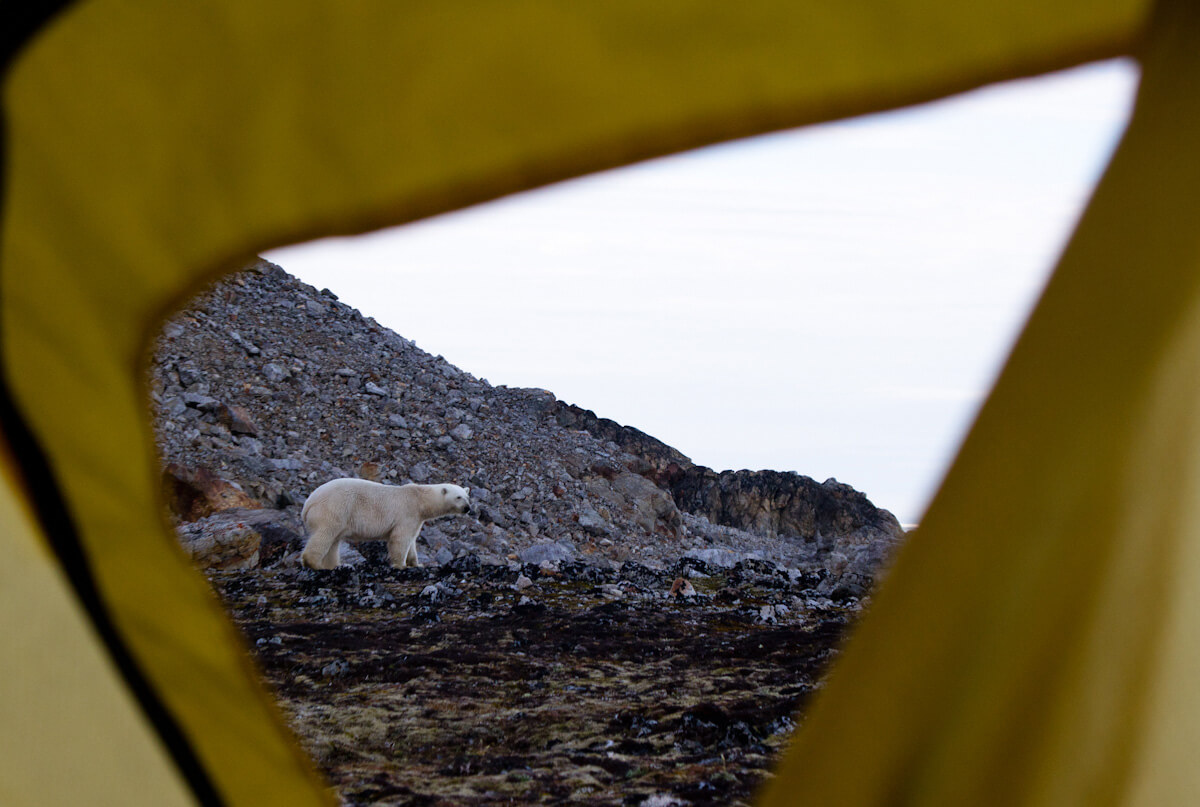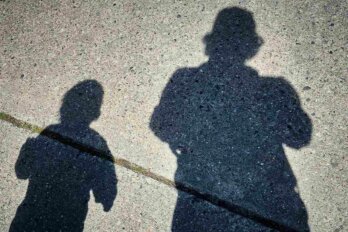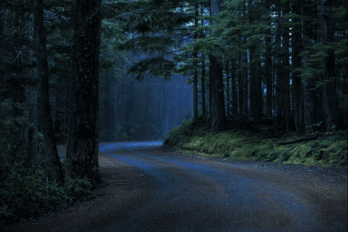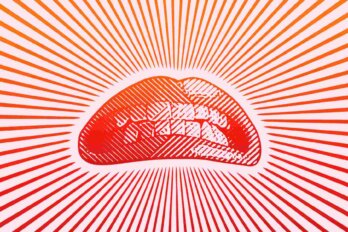Erik Boomer and I had been skiing, walking, crawling, and paddling for ninety-three days across ice and rock and wave. We were nearing the end of our circumnavigation of Ellesmere Island, the 200,000-square-kilometre rock that is the most northerly point in Canada. Our bodies were breaking down, and our stomachs half empty, but none of that mattered. Today we were paddling over flat water through a glistening maze of sea ice.
Then I saw a sudden flash under the bow of Boomer’s kayak. It didn’t register in my brain as animal, vegetable, or mineral, just light and motion—electromagnetic waves travelling at warp speed, as if it were an underwater aurora. It doubled back on itself, almost silvery, like a tiny flying fish, although it was too big for that. And then, an instant later, a walrus rose out of the water like an apparition, on the left side of Boomer’s kayak, just behind the cockpit. The ton of gracefully awkward skin, blubber, and muscle ascended out of the depths, revealing ever more of its improbable bulk wrapped in brown, wrinkled skin, as if it would soon leap entirely out of the water like a breaching whale.
Inuit hunters, from all over the Arctic, have told me that an angry, rogue walrus will hook a kayaker with its tusks, tip him over, and then, not eat him as a crocodile would, but suck out his intestines as if to savour the gooey flesh of a giant clam. While this image hovered in my mind, the massive ivory tusks hovered over Boomer’s shoulder, protruding out of the bulging jowls, scraggly moustache, and almost catlike inverted V of a mouth. As Lewis Carroll noted, the walrus’s face not only evokes power and danger, but also, paradoxically and mysteriously, silliness and improbability woven together with sage wisdom:
The time has come, the Walrus said,
To speak of many things,
Of shoes and ships and sealing wax
Of cabbages and kings.
For an instant, power, danger, humour, beauty, and mystery were poised in space at that apex between the top of the lunge and the moment when gravity drags everything back downward. I knew that Boomer was dead. I was twenty metres away, too far to react in any meaningful way. And even if I had time, what could I do?
The shotgun was on Boomers boat, but it would be useless anyway because you can’t shoot when your partner and an attacker are locked in mortal, hand-to-hand swirling combat. Boomer was dead, and there was no other possible outcome. In that moment of non-time, I realized how much I loved the man. A flash image passed through my brain about Antarctic explorer, Douglas Mawson, who traveled onward after both of his companions had perished across a landscape where “loneliness was in the vast wasted land outside in the soughing wind, in the corners of his mind, in the anguish and in the fear for his own safety.” But hopeless as it was, I had to fight back, so I dipped my paddle in the water to race forward and do battle.
I don’t think that the walrus’s shoulder actually touched Boomer’s kayak, but the upwelling water tipped the boat dangerously on edge. In retrospect, I am so glad he attacked Boomer, and not me—not because I wish my friend any harm but because his reflexes are so much faster than mine that he survived when perhaps I would have perished. Boomer reached his paddle out on the right side to stabilize himself with a quick aggressive brace, and then in one fluid, continuous motion he brought the paddle flying back—whack—to smack the walrus on the nose. Quickly, another sharp whack, and with his paddle almost tangled in the massive tusks, he pushed hard against the sea monster’s face to propel him out of immediate harm’s way. I must have been frozen momentarily because Boomer glanced over his shoulder with a look of terror, mixed almost with a wry grin. Then he shouted one command, “Paddle!”
The walrus settled back into the water and serenity spread once again across the seascape.

We reached Cape Faraday that afternoon and visited the ruins of tiny stone igloos used by the Stone Age migrants in 1853. Like the bleached bones of the kayaks we had found earlier in the voyage, these humble habitations were another silent reminder of our ancestors on an improbable, treacherous migration across this landscape, huddled by the light of blubber lamps, through the interminable darkness of a polar winter. I had visited this cape with my partner, Chris, on an expedition in 1988, before we had veered east, left Ellesmere, and crossed over to Greenland. At that time, as young lovers, we had spent an afternoon wandering through this sacred site. Now I walked away from Boomer to be alone for a moment, to think about Chris’s strength and bravery, and the wondrous marriage that we had shared. It was a time to grieve, again, but I was exhausted down to my core, too close to the razor-thin edge of the near disaster we had faced earlier in the day to reflect deeply on Chris’s untimely death six years ago. I wrote in my journal: “Boomer attacked by walrus. Got to Cape Faraday. See old ruins. 26 miles. Tired.”
Suddenly there were polar bears everywhere, every day. My laconic journal entries record their passage: “Polar bears on floe, but no hassle.” “Saw two young bears, probably litter-mates, hunting on broken ice. They checked us out. Boomer got out the gun but no problems.” “Saw two bears while paddling. Then a bunch more. Then a mom and two cubs at camp. If I remember correctly, that makes 11 for the day.”
On the night of August 15, day ninety-eight of the expedition, I wrote: “The sun is losing its power and I am cold a lot. Above freezing but wet. Rashes on hands. Feet swollen.” Then I crawled into my damp bag and dozed off. The tent was swaying in the wind, a movement that registered peacefully in my sleeping brain, as sailors know the motion of their boats at some deep subliminal level that pervades sleep. Around 1:00 a.m., the gentle undulation became a sharp jerk. I awoke abruptly, knowing in my heart to scream, “Go away bear!” I reached for the shotgun that lay between us, but Boomer, quick as he is, had already grabbed it. Then the world went silent again, except for the wind. We sat shoulder to shoulder, the barrel of the gun swaying ominously back and forth, as we looked and listened apprehensively, waiting fearfully for the seemingly inevitable paw swipe that would shatter our little nylon home. When the anticipation became unbearable, Boomer held the loaded weapon in one hand, with the safety off and his finger on the trigger, and cautiously zipped open the inner tent door to peek into the vestibule. There, not more than an arm-length away, was the polar bear—two curious eyes staring back and a long black snout protruding incongruously, curiously, almost comically, into the hole in the tent that the bear had just torn.
From previous experience, Boomer and I had decided that tough-talking profanity was the best first line of defense. We had to somehow communicate to the bear, You’re bad. But we’re just as bad. Or badder.
“Fuck you bear! Fuck the horse you rode in on!”
The bear backed away. Boomer unzipped the outer door of the rain fly and as I peered over my friend’s shoulder, I could see two additional males, along with a mother and two cubs, all hanging out among the nearby rocks. The bear who had entered our abode was sulking away, his nose to the ground, like a child caught with her hand in the cookie jar. The bears moved off slowly, sideways, telling us with body language, “We’ll leave now, because you are making such an awful racket, but we’re not really afraid of you.”
Once again, I was faced with the question that I had asked on the second day of the expedition, Why weren’t we attacked? If the bear had charged, or if they had all made a coordinated attack as if attacking a seal—moving fast and resolutely, swiping with their powerful paws, snapping their ferocious canines—surely they could have killed us before we had the time to grab the gun. To understand their restraint you have to assign motives, emotion, or even human-like thought-processes to these wild animals, which is dangerous ground and open to criticism or even rebuke in this urban, scientific, us-centered world we live in. But I’ve been here before. I believe that this bear had a unique and wondrous consciousness, just as we have. It’s different of course, and perhaps unmeasurable, but it’s there. And in that bear’s consciousness, it recognized in some electromagnetic way that Boomer and I also have a unique and wondrous consciousness. That, even though we were potentially edible, we were different than a seal. Maybe it was fear, maybe respect. Or maybe something I can’t define.
In those moments, when Boomer and I sat shoulder to shoulder in the waning twilight of the Arctic summer, we communicated mammal to mammal. Restraint, fear, respect, oneness, unity, solidarity—just words again. But I am convinced that we both understood that we were equally powerful, potentially fearsome, blobs of DNA and protoplasm. Certainly, we smelled different than a seal, and it’s perfectly reasonable to argue that the bears were just afraid of us. But I like to think that in addition, we shared a bonding higher level of mammalian consciousness; that together we were sharing the beauty and hardships of this frozen landscape. And once you cross that line and recognize the sentience out there in nature, once you stare face to face with a living, breathing polar bear and negotiate a détente—you don’t eat me, I won’t shoot you—then your relationship with the planet changes.
In his short story The Bear William Faulkner wrote, “It seemed to him that he could never see the two of them, himself and the bear, shadowy in the limbo from which time emerged, becoming time; the old bear absolved of mortality and himself partaking, sharing a little of it, enough of it. And he knew now what he had smelled in the huddled dogs and tasted in his saliva. He recognized fear. So I will have to see him, he thought, without dread or even hope. I will have to look at him.”
Faulkner’s final seven words sum up Deep Ecology. In my interpretation, when the boy says the final line he is clearly talking about a much deeper interaction than mere vision, it is about feeling the environment at a deep visceral level. It is about smelling the polar bear’s stale, seal meat breath and telling him to get lost—even while you are honouring the creature that has paid you a visit. Deep Ecology is about real and metaphorical passages—ducks skimming over the water, walrus attacks—and embracing our own powerlessness—the cold, the sore toes, and swollen feet—as we pass into the zone beyond willpower. We each strive to survive, while at the same time revering the Bear Spirit, the Walrus Spirit, and the Ice Spirit that might easily kill you in an instant. There is no other way.
Excerpted and adapted form Crocodiles and Ice: A Journey into Deep Wild by Jon Turk, available September 15.





